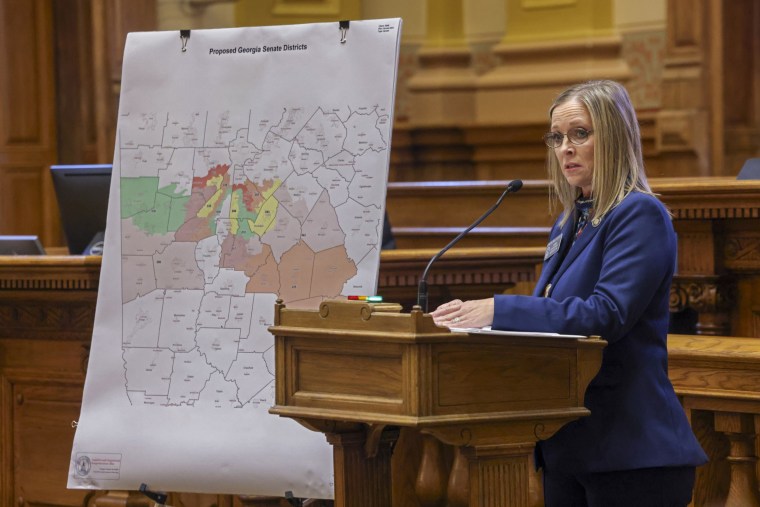Georgia’s Republican-controlled Legislature gave final passage to a new congressional redistricting plan on Thursday, approving a map that dismantles a minority-majority district to create a new court-ordered Black-majority district.

The plan maintains the congressional delegation's existing partisan political balance, with districts that are likely to elect nine Republicans and five Democrats. It will almost certainly land the state back in court. The map passed 98-71.
"It's a high stakes, high-risk maneuver," said Michael Li, a redistricting expert at the Brennan Center for Justice.
U.S. District Court Judge Steve Jones ruled in October that the state’s congressional map was unlawful and must be redrawn to provide for fair representation of the state’s Black voters, who fueled much of the state’s population growth over the last decade. The order also stated that “the State cannot remedy the Section 2 violations described herein by eliminating minority opportunity districts elsewhere in the plans.”
The Republicans’ map appears to do just that, by dismantling Democratic Rep. Lucy McBath’s 7th Congressional District — a majority-minority district east of Atlanta where Black, Hispanic and Asian voters have historically elected Democrats — to create a new majority-Black 6th Congressional District.
The map is expected to be signed by Georgia's Gov. Brian Kemp, a Republican, at which point it will almost certainly end up back in federal court. To defend the map, the state will need to argue that coalition districts are not protected by the Voting Rights Act.
"It's not an issue the Supreme Court has decided," Li said.
Georgia Democrats decried the maps as noncompliant, repeatedly reading the court order aloud on the floor Thursday.
“The Republican drawn map not only fails to meet all the requirements laid out by Judge Jones order, but it perpetuates gerrymandering and undermines the principles of fair representation,” Democratic state Rep. Billy Mitchell said. “At the end of Election Day, the results ought to reflect the will of the people, not the craftiness of mapmakers.”
State Rep. James Beverly, a Democrat, condemned the map as "unlawful" and "wrong."
"I oppose this map because this ain't a Georgia map, this is an Alabama map," said state Rep. James Beverly, the minority leader.
Alabama legislators refused to draw a second Black opportunity district earlier this year, despite the U.S. Supreme Court affirming a decision requiring them to do so. That state is 26% Black, but Republicans there sought a map where just one of the state's seven congressional seats would have a majority of Black voters.
A federal court hired a special master to draw Alabama's map instead, giving Black voters two seats in which they can elect the representative of their choice in the 2024 elections.
Republicans defended the map as fair and complaint with the order.
State Rep. Rob Leverett, the Republican chair of the House's redistricting committee, said that the term "minority opportunity district" applied only to Black voters in the order.
"He is writing in the context of a case in which the only claims have involved Black voters, they didn't involve other minorities and they didn’t involve this somewhat novel and largely rejected theory that you can take different people from different minorities and add them up to get above 50%," he said.
"We believe the Supreme Court precedent supports just a contrary view that it’s not protected by the Voting Rights Act," he added.
If the U.S. Supreme Court were to rule that the Voting Rights Act doesn't apply to coalition minority districts, Li said it would have a significant effect, making it particularly easier to gerrymander diverse suburbs around the country.
"It could be really big. For all the talk of Alabama, there aren't a lot of situations that are like Alabama," he said. "Those are relatively few compared to the places where you might be able to make claims for coalition districts."
